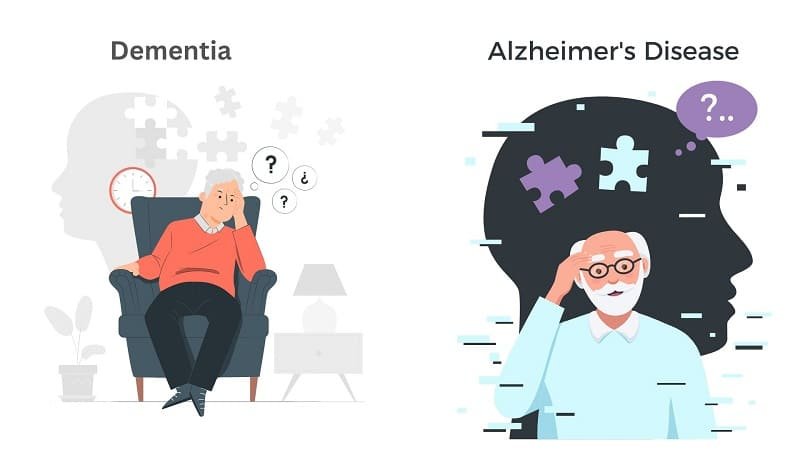Introduction:
As we navigate the complex landscape of aging, it’s essential to be vigilant about cognitive health. Alzheimer’s disease, a progressive neurological condition, can manifest in subtle ways, particularly in one’s 60s. In this blog, we’ll explore the early signs of Alzheimer’s in your 60s, shedding light on what to watch for and how early detection can make a significant difference.
Recognizing the Early Signs:
Memory Loss Beyond Normal Aging: One of the initial indicators is memory loss that extends beyond typical age-related forgetfulness. Individuals may struggle to remember recently learned information or find it challenging to retain new details.
Difficulty Planning and Solving Problems: Early signs may include difficulties in planning and solving problems. Simple tasks, such as following a familiar recipe or managing monthly bills, may become more challenging.
Confusion with Time and Place: Individuals in their 60s with early-stage Alzheimer’s may experience confusion about time and place. They might lose track of dates, seasons, or the passage of time.
Trouble Understanding Visual Images and Spatial Relationships: A decline in the ability to understand visual images and spatial relationships can be an early sign. This might manifest as difficulty judging distance or determining color and contrast.
New Challenges with Words in Speaking or Writing: Early signs may involve individuals having trouble joining or following a conversation. They might struggle with finding the right words or using inappropriate ones, making communication increasingly challenging.
Misplacing Items and Being Unable to Retrace Steps: People with early-stage Alzheimer’s may regularly misplace items and find it difficult to retrace their steps. Everyday items may end up in unusual locations, and retracing one’s actions becomes a perplexing task.
Decreased Judgment and Decision-Making: A noticeable decline in judgment and decision-making can be an early red flag. Individuals might make poor financial choices or exhibit decreased attention to personal grooming and hygiene.
Social Withdrawal and Changes in Personality: Early signs may include social withdrawal and changes in personality. Individuals may become more reserved, anxious, or exhibit shifts in mood and behavior that are noticeable to those close to them.
Alzheimer's Symptoms and Stages
| Stage | Symptoms |
|---|---|
| Early Stage | Memory loss beyond normal aging |
| Difficulty in problem-solving and planning | |
| Middle Stage | Confusion with time and place |
| Trouble understanding visual images and spatial relationships | |
| New challenges with speaking or writing | |
| Late Stage | Misplacing items and being unable to retrace steps |
| Decreased judgment and decision-making | |
| Social withdrawal and changes in personality |
Conclusion:
Understanding and recognizing the early signs of Alzheimer’s in your 60s is crucial for timely intervention. If you or a loved one is experiencing these symptoms, seeking medical advice promptly allows for early diagnosis and the initiation of appropriate care and support. Stay proactive about cognitive health, and together, we can navigate the challenges of aging with knowledge and preparedness.
Faq Related to "Early signs of Alzheimer’s in 60s"
Early signs include memory loss beyond normal aging, difficulty in problem-solving, and challenges with planning. These may manifest as forgetfulness and struggles with routine tasks.
Alzheimer’s progresses through three main stages: Early Stage, Middle Stage, and Late Stage. Each stage presents distinct symptoms, with cognitive decline intensifying as the disease advances.
The Middle Stage is marked by confusion with time and place, difficulties in understanding visual images, and challenges in speaking or writing. Cognitive decline becomes more noticeable during this stage.
In the Late Stage, individuals may experience advanced symptoms such as misplacing items, decreased judgment, and social withdrawal. Changes in personality become more pronounced.
Currently, there is no cure for Alzheimer’s, and symptoms cannot be fully reversed. However, early diagnosis and appropriate care can help manage symptoms and enhance the quality of life for individuals affected.
If you observe early signs, it’s crucial to seek medical advice promptly. Early diagnosis allows for interventions that can slow down the progression and help in planning appropriate care and support.
Support involves adapting communication, providing a structured routine, and addressing safety concerns. Caregivers may also consider involving healthcare professionals and support groups for guidance.
Late-stage challenges include severe cognitive decline, behavioral changes, and a decline in motor skills. Caregivers can cope by creating a safe environment, ensuring proper nutrition, and seeking support from healthcare professionals.
While there is a genetic component to Alzheimer’s, it is not solely hereditary. Environmental factors and lifestyle choices also play a role. Individuals with a family history may have a higher risk, but it does not guarantee the development of the disease.
Various clinical trials and research are ongoing, but there is no definitive cure. Experimental treatments often focus on early-stage interventions. Individuals interested in participating in clinical trials should consult with healthcare professionals.










